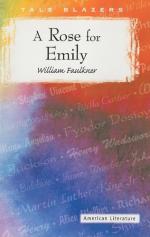|
This section contains 2,478 words (approx. 9 pages at 300 words per page) |

|
SOURCE: “Atmosphere and Theme in Faulkner's ‘A Rose for Emily,’” in William Faulkner: Four Decades of Criticism, edited by Linda Welshimer Wagner, Michigan State University Press, 1973, pp. 192–98.
In the following excerpt from an essay originally published in Perspective in 1949, West interprets “A Rose for Emily” as an allegory in which Emily represents the Old South and Homer Barron represents the new order influenced by the North.
The first clues to meaning in a short story usually arise from a detection of the principal contrasts which an author sets up. The most common, perhaps, are contrasts of character, but when characters are contrasted there is usually also a resultant contrast in terms of action. Since action reflects a moral or ethical state, contrasting action points to a contrast in ideological perspectives and hence toward the theme.
The principal contrast in William Faulkner's short story “A Rose for Emily” is...
|
This section contains 2,478 words (approx. 9 pages at 300 words per page) |

|


